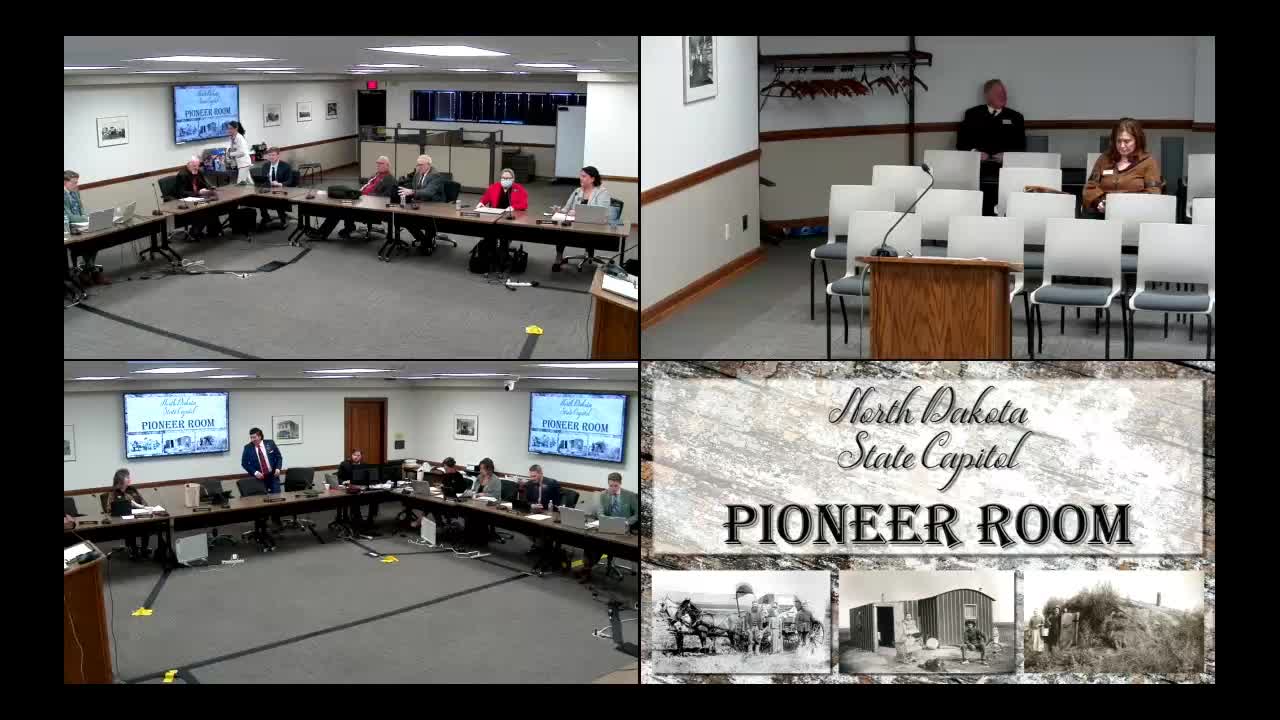House Human Services Committee advances several bills, sends some to further review
Get AI-powered insights, summaries, and transcripts
Subscribe
Summary
The House Human Services Committee voted on a package of bills covering statutory language, public-health rules, reporting requirements and adult foster-care monitoring. Several bills passed out of committee; one measure to audit pregnancy resource centers was rejected after debate.
The House Human Services Committee on Thursday voted to advance a package of bills on topics including statutory language cleanup, disease‑transmission penalties, vaccination‑related notices and adult foster care monitoring while deferring further action on some items for follow-up.
The committee approved final motions or advanced bills on House Bills 11‑81, 12‑17, 14‑50, 14‑57, 14‑58, 14‑60, 15‑11, 15‑64 and 16‑05; it voted a final “do not pass” on House Bill 15‑95. Several other bills were set aside for amendment or further review. The committee said it planned to resume work the next morning to finish remaining items.
Why it matters: the group of bills affects criminal‑code language about infectious disease, requirements for vaccine information and exemptions, definitions and professional standards related to counseling practices, and monitoring and reporting requirements for certain care settings. Committee members debated statutory language, professional‑ethics implications and public‑health tradeoffs before casting roll‑call votes.
Most consequential votes and debate House Bill 11‑81 (statutory language cleanup): The committee adopted sponsor amendments and voted a due‑pass motion as amended (tally 11 yes, 2 no, 0 abstain). Members discussed changes to gender‑neutral statutory language and legislative counsel explained how the Century Code treats gendered terms.
House Bill 12‑17 (removes felony penalty for willful transmission of HIV): Members debated whether similar conduct is handled in public‑health code or criminal code. The committee voted to give the bill a due pass (7 yes, 6 no, 0 abstain).
House Bills addressing vaccines and exemptions (14‑57, 14‑58): Members discussed requirements that the state publicize available exemptions and what information must be provided to people subject to vaccine requirements. Representative Hendricks argued for clearer public notice of exemptions, saying the public often does not know their rights. The committee advanced both bills (each recorded 7 yes, 6 no, 0 abstain for final action where recorded).
House Bill 14‑50 (consent/recording rules for minors’ standardized questions): Sponsor amendments were adopted and the bill advanced (10 yes, 3 no, 0 abstain). Committee members asked that categories of questions be disclosed to minors and guardians.
House Bill 14‑60 (electronic monitoring in adult foster care): The committee reconsidered earlier action, clarified language to extend monitoring‑device rules to adult foster‑care providers (not only substitute or respite caregivers), adopted the amendments and voted a due pass as amended (13 yes, 0 no, 0 abstain). Legislative counsel confirmed the change moves the provision into a new code section to cover the intended providers.
House Bill 15‑11 (provider education tied to pending litigation): The committee adopted amendments and voted a due pass as amended (10 yes, 3 no, 0 abstain). Some members said training tied to litigation could cause confusion while the legal case remains unresolved.
House Bill 15‑64 (changes to Indian Child Welfare Act‑related references): The committee voted a due pass (13 yes, 0 no, 0 abstain).
House Bill 15‑95 (audit/reporting of pregnancy resource centers): Committee debate split on whether state oversight was necessary for organizations receiving public funds. After an initial failed motion and follow‑up, the committee recorded a final “do not pass” recommendation (motion carried 11 yes, 2 no, 0 abstain for do‑not‑pass).
House Bill 16‑05 (local control over municipal water fluoridation): The committee voted to advance the bill (7 yes, 6 no, 0 abstain), with members citing prior local votes on fluoridation as part of their deliberations.
What sponsors and members said - Legislative counsel (Aaron) explained the Century Code convention on gendered terms during the HB 11‑81 amendment discussion: “If it says a man, it also includes a woman. If a gender is specified in any language in the Century Code, it would apply to all genders.”
- Representative Hendricks, during vaccine‑related debate, urged clearer public notice: “I think that we have a responsibility to take an extra step to say that people should be clearly given this information and clearly told exactly what the exemptions are and to make sure we protect those rights.”
- On a bill defining limits around so‑called conversion therapy (HB 14‑30 amendments), the sponsor and supporters said they had drawn definitions from other states: “The definition for conversion therapy that we found came from the Minnesota Department of Health,” a sponsor said during discussion. Several social‑work practitioners warned the committee that the proposed language could conflict with professional‑ethics standards and recommended further work with the Board of Social Work.
Procedure, next steps and follow‑up Several bills were set aside for additional amendments or to await responses from state boards (for example, the Board of Social Work) or agency counsel. The committee said it would reconvene at 9:00 a.m. to continue work and attempt to clear remaining items before the Appropriations scheduling deadline referenced by the chair.
Votes at a glance (final recorded committee action) - HB 11‑81 — Due pass as amended; final tally 11‑2‑0. - HB 12‑17 — Due pass; final tally 7‑6‑0. - HB 14‑50 — Due pass as amended; final tally 10‑3‑0. - HB 14‑57 — Due pass; final tally 7‑6‑0. - HB 14‑58 — Due pass as amended; final tally 7‑6‑0. - HB 14‑60 — Due pass as amended; final tally 13‑0‑0. - HB 15‑11 — Due pass as amended; final tally 10‑3‑0. - HB 15‑64 — Due pass; final tally 13‑0‑0. - HB 15‑95 — Committee recorded a final recommendation of do not pass; final tally on do not pass motion 11‑2‑0. - HB 16‑05 — Due pass; final tally 7‑6‑0.
The committee recorded additional actions (reconsiderations, holds and requests for agency comment) and indicated it would resume consideration the following morning to finish votes and collect needed clarifications.
